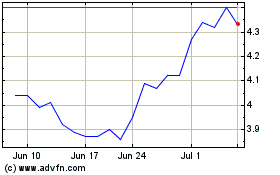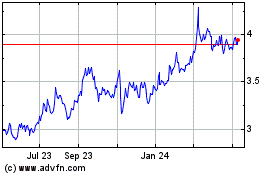3rd UPDATE: South Korea To Step Up Monitoring Of Foreign Banks
May 31 2011 - 5:27AM
Dow Jones News
SEOUL (Dow Jones)--South Korea said it would step up monitoring
of foreign banks operating in the country after finding cases of
improper outsourcing of key trading operations, marking the latest
step in the nation's efforts to contain potentially destabilizing
capital flows and adding another measure focusing on the role
foreign banks play in triggering volatility in local financial
markets.
Financial Supervisory Service Deputy Gov. Kim Yung-dae told
reporters at a briefing Tuesday that some foreign bank branches in
Korea were handing over day-to-day trading operations involving
money held in local accounts to a bigger foreign branch or regional
headquarters in places like Hong Kong and Singapore. Such
outsourcing is illegal in Korea.
"Such practices stem from the foreign banks' desire to manage
their entire Asian portfolio," Kim said. "In cases of big
investment banks, trading on a regional level can have a great
impact on the domestic financial markets as such management can
lead to sharp changes to the portfolios of the banks' local
branches."
Kim said HSBC Holdings PLC (HBC) and Credit Agricole S.A.
(CRARY) have already been sanctioned for improper outsourcing of
operations involving derivatives.
A person familiar with the situation told Dow Jones Newswires
later Tuesday that the Royal Bank of Scotland Group PLC (RBS) may
also be sanctioned for engaging in similar activity, with the FSS
likely to decide on the matter in June or July.
Credit Agricole declined to comment, while HSBC and RBS had no
immediate comment.
Local authorities have introduced several measures since last
June to safeguard the economy from potential shocks triggered by
so-called hot money. Asia has seen a surge of foreign capital into
its markets amid expectations for economic growth and higher
interest rates as the region's central banks combat inflation--and
Korea has been no exception to the trend.
South Korea fears that capital inflows could exit just as
swiftly, like they did during the 1997-1998 Asian financial crisis
and the 2008 economic crisis. So the local government last June
implemented a cap on the amount of foreign-exchange forwards
positions that banks operating in the country can carry, as such
contracts can be used to speculate on future market moves involving
the South Korean won.
Foreign banks have been under scrutiny because their Korean
branches tend to take on short-term foreign currency loans to do
business like corporate financing and trading of derivatives and
securities--activity which can lead to sharp swings in financial
markets, particularly the won. They are also often the
intermediaries for foreign investors looking to move money in and
out of the country.
While not directly related to the current issues, the emphasis
for greater regulatory supervision of foreign banks has been
heightened following a Nov. 11 incident when Deutsche Securities
Korea, the local unit of Deutsche Bank AG (DB), triggered a massive
drop in the local stock market in the last 10 minutes of trade by
selling KRW2.44 trillion worth of stocks.
Local authorities subsequently ruled the Deutsche unit
deliberately manipulated the market that day, dumping the shares on
the stock market to profit on "speculative derivative positions"
through the options and futures markets, and suspended the
brokerage's proprietary securities and exchange-listed derivative
trading operations for six months.
"Foreign banking branches (in Korea) are considered to have a
great effect in increasing the volatility of capital flows in and
out of the market," the FSS said in a separate statement,
explaining the need for greater monitoring of their business
operations.
A government official told Dow Jones Newswires Tuesday that Bank
of Korea and the FSS are jointly probing the Korean operations of
Mizuho Financial Group Inc. (MFG) unit Mizuho Corporate Bank and
Mitsubishi UFJ Financial Group Inc. (MTU) unit Bank of
Tokyo-Mitsubishi UFJ as part of their investigation on foreign
banks' role in the issuance of kimchi bonds--foreign-currency
denominated debt issued in Korea.
Mizuho and Bank of Tokyo-Mitsubishi UFJ declined to comment.
Local authorities are seeking to regulate the growing use of
kimchi bonds to circumvent local restrictions on foreign-currency
borrowings. The authorities suspect foreign banks are arranging
such kimchi bond deals, advising local companies that the
instrument could lower funding costs.
Under Korean law, banks can only provide loans in foreign
currencies if borrowers need the funds for overseas use. However,
the authorities suspect that the local companies selling kimchi
bonds are going into the swap market to change the proceeds into
won, with foreign banks acting as counterparties.
The FSS plans to inspect 15 of 37 foreign banks operating in
Korea annually to monitor their fund management from this year,
citing the need to proactively manage potential market risks. The
authority also said it will conduct inspections on foreign banks
whenever there are concerns about improper fund management or
whether they are complying with capital flow regulations, such as
in their foreign-exchange forward positions.
"We will expand our joint inspections with the Bank of Korea on
foreign-exchange transactions when necessary," the FSS said.
-By Se Young Lee, Dow Jones Newswires; +82 2 3700 1904;
vincent.lee@dowjones.com
Mizuho Financial (NYSE:MFG)
Historical Stock Chart
From May 2024 to Jun 2024

Mizuho Financial (NYSE:MFG)
Historical Stock Chart
From Jun 2023 to Jun 2024
